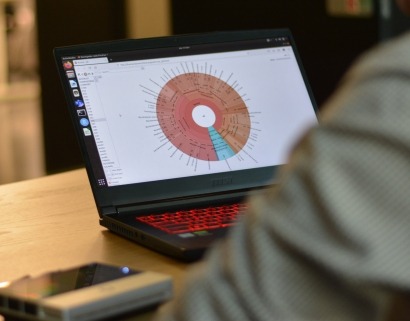
The discovery was made by researchers from Germany, Spain and the Netherlands, who took 80 samples of decomposing organic matter from 45 large-scale biogas production plants (in Germany, The Netherlands and Austria) and applied DNA sequencing to study their microbial composition. Astonishingly, members of Darwinibacteriales were present in all 80 samples, despite the differences and distance between these plants.
The scientists were looking for the key microbial players in a process called anaerobic digestion, whereby organic matter is degraded and then transformed into energy-rich gas which can be used as fuel. This process is considered a black box, as the role and dynamics of most of the microorganisms involved remain unknown.
Improvement of biogas production would constitute a pivotal change in the energy industry—reducing dependence on fossil fuels and imported energy—but the lack of microbiological research has held back the sector.
“This is a beautiful example of something that was under our noses, which is essential for biogas production, but remained hidden,” says Manuel Porcar, Micro4Biogas coordinator from the University of Valencia (Spain) and co-author of the papers. “Our work shows the tip of a microbial iceberg which most likely holds the key for biogas production but had never been characterized at the genomic level.”
With this discovery, scientists from the Micro4Biogas consortium are poised to create tailored, super-efficient communities of biogas-producing microbes. Their aim is to make biogas plants more robust and less reliant on subsidies to run commercially, providing a boost for renewable energies worldwide.
An overlooked group of microbes
To understand the composition and diversity of the microbial communities present in all the samples collected, a taxonomic analysis was performed, sequencing one specific gene (the 16s rRNA gene) for the entire sample. Results were compared to reference databases to determine which species or taxa were present and their relative abundance.
MBA03 had been previously reported as a group of uncultured bacteria (those not grown in the lab) in other studies, but no one had paid close attention to it before.
“It was usually detected when analysing anaerobic digestion microbiomes via 16s rRNA gene sequencing,” explains Adriel Latorre, Director of the Genomics Department at Darwin Bioprospecting Excellence and corresponding author of the study.
To perform in-depth research into this unknown group, 30 samples where the presence of MBA03 had been confirmed were fully sequenced.
“But astonishingly, when we analyzed the complete metagenomes of the 30 samples, we did not detect MBA03 in any of them. This revealed a technical limitation: the genome of this taxon was not available in the databases. From that moment on, our goal was clear: we had to isolate the MBA03 genome and describe it in depth.” says Latorre.
Using the Micro4Biogas dataset, phylogenetic and phylogenomic reconstructions corroborated that MBA03 constitutes a new order, that is the taxonomic group above family, genus, and species. The new order has been called: Darwinibacteriales.
The scientists suspect that one particular family within this new order (i.e., family Darwinibacteriaceae) work in mutualistic collaboration with archaea, another type of microorganisms involved in anaerobic digestion.
The bacteria produce metabolic compounds which the archaea then use to generate methane gas. This matches with previous studies that established a correlation between the abundance of MBA03 and biogas production. If confirmed, these bacteria will be a very promising target for developing strategies to increase and improve biogas production.

